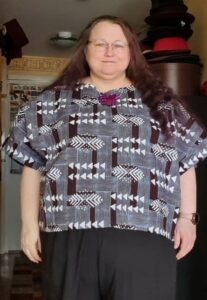For our summer newsletter, I spoke to Karin Bredenberg from Kommunalförbundet Sydarkivera, who joined the OPF earlier this year.
Tell us a bit about yourself and your role

In 2019, I joined the staff at Kommunalförbundet Sydarkivera as the metadata strategist. This means that I am responsible for our long-term storage and the implementation and use of the available metadata standards like PREMIS and METS and some more. In my role, I also have a commitment to leading and participating in the working groups for PREMIS, METS, EAD and EAC-CPF and the DILCIS Board. I am also the activity lead for specifications within E-ARK3.
How did you get here? What was your path into digital preservation?
My path into digital preservation was a winding one. I started my life as an electrical engineer planning power plants and such. Life went on and I ended up with a bachelor’s degree in computer science with a focus on programming. During my bachelor’s, I wrote a paper for the Swedish National Archives about the use and possible first implementation of the Metadata Encoding and Transmission Standard (METS). I was asked to stay at the National Archives and got to implement that paper and make it evolve. More and more standards got added to my portfolio and I participated in different projects and became a member of the standards working groups. This means that I have participated in both the development and implementation of standards such as EAD, EAC-CPF, PREMIS, METS. The next step for me was to get closer to the use of standards and the perfect match for me was made with Sydarkivera.
What are you working on at the moment?
Currently, my main focus together with my colleagues is an internal project looking at implanting more tools to be used in the transfer process of materials from our members to Sydarkivera’s long-term archive. Tools that facilitate an easier transfer both for our members as the senders and us as the receiving part. For example, this Spring we have looked closely at the Database Preservation Toolkit (DBPTK), FIDO and Jpylyzer, and now are ready to implement them into our process and receiving system. At the same time, the work in E-ARK has produced a lot of specifications and guidelines, all of which have been on or are on public review and the final touches before publication is needed. Standards-wise, EAC-CPF is currently undergoing a revision and EAD is starting its revision. For the other standards I’m working with, there is a lot of work going on behind the scenes to make things easier using webpages and also preparations for updates of the standards.
What do you see as the main benefit of OPF membership?
The main benefit for being a member is that we are part of a professional organisation being a key player in the digital preservation world. We as members can participate in the work and have an excellent resource with webinars available to educate ourselves! It’s important for us that the tools are maintained and that we can aid in keeping them open source and available for all!
Who are you / what do you like to do in your free time?
Free time? Well, those who know me will know that I do a lot of different things in my free time. Churches anyone? Me and my husband visit and take pictures of churches and we have our own webpage for that. There are about 3,700 in Sweden. I am limiting myself to churches in capitals like Berlin, Rome, and such. The current pandemic has limited that use of free time, but we have managed to enter some of the ones close by after trying for several years. (If it’s open, it’s open. We don’t book a visit.) Or sewing? I am on the quest to create a made-by-me wardrobe. Running? An excellent way of seeing the city in the early morning. Sadly, I have not been able to do it in a while, but I am getting back there. And do not forget baking!


